Geological Time Scale
The geological time scale is a system of chronological dating that relates geological strata to time. It is used by geologists, paleontologists, and other Earth scientists to describe the timing and relationships between events that have occurred during the Earth's history.
Eras of the Geological Time Scale
The geological time scale is divided into several eras, each of which is further divided into periods and epochs. The major eras include:
Key Concepts
Key concepts related to the geological time scale include:
- Fossils: Remains or traces of ancient life forms that are found in sedimentary rocks and provide evidence of past life on Earth.
- Rock Strata: Layers of rock that are formed over time and can provide information about the Earth's history.
- Radiometric Dating: A method of dating geological or archeological specimens by determining the relative proportions of particular radioactive isotopes present in a sample.
Study Tips
When studying the geological time scale, consider the following tips:
- Use mnemonic devices to remember the order of the geological time scale divisions.
- Review the characteristics of each era, period, and epoch, including key events and life forms that existed during those times.
- Practice using the geological time scale to interpret the age of rock layers and fossils.
[Geological Time Scale] Related Worksheets and Study Guides:
.◂Science Worksheets and Study Guides Fourth Grade. Light and Sound
Study Guide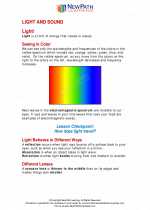 Light and sound
Light and sound  Worksheet/Answer key
Worksheet/Answer key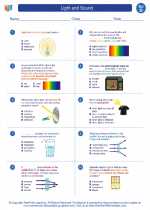 Light and sound
Light and sound  Worksheet/Answer key
Worksheet/Answer key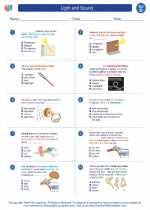 Light and sound
Light and sound  Worksheet/Answer key
Worksheet/Answer key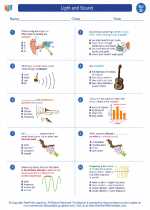 Light and sound
Light and sound  Vocabulary/Answer key
Vocabulary/Answer key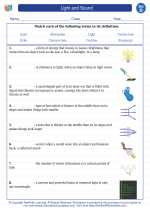 Light and sound
Light and sound  Vocabulary/Answer key
Vocabulary/Answer key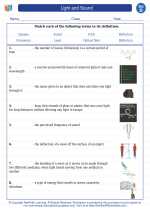 Light and sound
Light and sound  Vocabulary/Answer key
Vocabulary/Answer key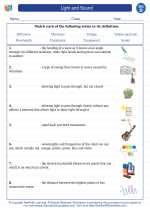 Light and sound
Light and sound 

 Worksheet/Answer key
Worksheet/Answer key
 Worksheet/Answer key
Worksheet/Answer key
 Worksheet/Answer key
Worksheet/Answer key
 Vocabulary/Answer key
Vocabulary/Answer key
 Vocabulary/Answer key
Vocabulary/Answer key
 Vocabulary/Answer key
Vocabulary/Answer key

The resources above cover the following skills:
PHYSICAL SCIENCE (NGSS)
Waves and their Applications in Technologies for Information Transfer
Students who demonstrate understanding can:
Develop a model of waves to describe patterns in terms of amplitude and wavelength and that waves can cause objects to move.